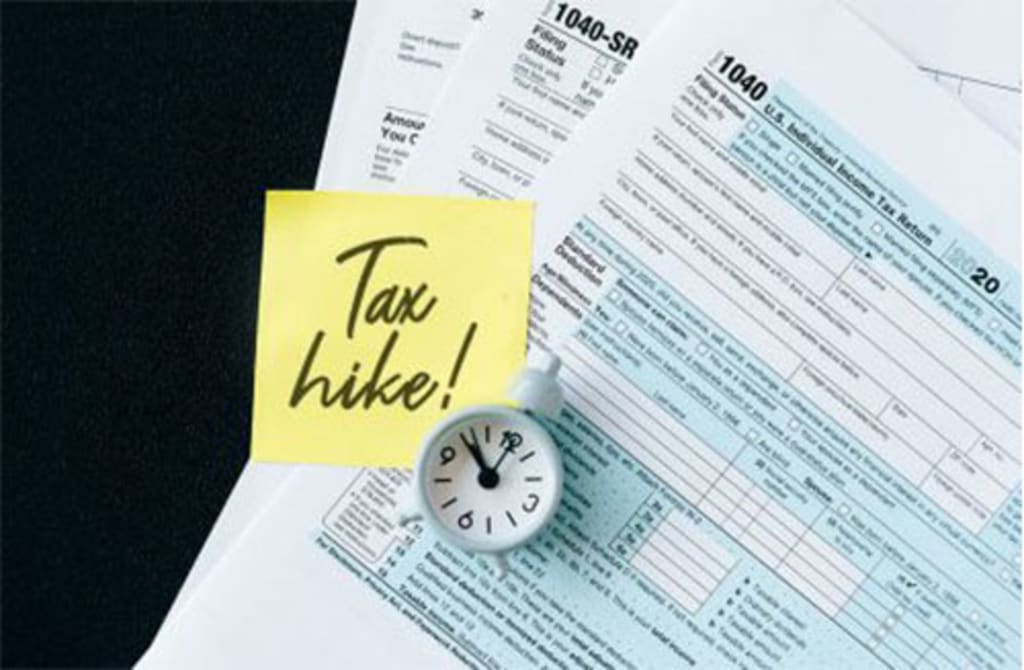How can the tax hike amidst pandemic affect you?
Is a rising dollar helpful for you?

A significant federal tax hike has been expected since 1993, and it is suspected to come soon. The purpose of the increase is to pay for the long-term economic program to help ease the financial burden of the pandemic.
An article published on forbes.com states that President Biden signed the $1.9 trillion American Rescue Plan into law, bringing the total stimulus spending authorized by the US government to $5.4 trillion.
According to Forbes, President Biden wants to collect hundreds of billions of dollars in taxes from big companies to finance his spending proposal.
Janet Yellen, US Treasury Secretary, has said before the House Financial Services Committee that we will need future tax hikes to pay for infrastructure projects and other public investments.
President Biden’s proposal can raise between $2 to $3 trillion within a decade, according to a Tax Policy Center and the American Enterprise Institute.
Many states are also thinking of increasing taxes for wealthy people. It is because of the economic fallout caused by the pandemic during the first quarter of 2020.
Will the proposed tax hike affect only the wealthy? To gain a better understanding, here’s a look at the points of the Biden administration’s tax proposal.
Proposed tax hike in America
These are the proposals under consideration:
- Raising the corporate tax rate from 21% to 28%.
- Increasing the income tax rate for people earning more than $400,000.
- For individuals, the top tax rate will increase from 37% to 39.6%.
- Capital gains tax increase from 23.8% to 39.6% for households earning more than $1 million annually. (Biden on the campaign trail proposed applying income-tax rates, which would be higher).
- Paring back tax preferences*1 for so-called pass-through*2 businesses, such as limited liability companies or partnerships.
- Social security payroll tax of 12.4% on individuals earning more than $400,000.
- Expanding the estate tax’s reach (that is, federal estate tax on property transferred from deceased persons to their heirs). Modeled after the Obama administration proposal, the heirs will have to pay income taxes on assets they receive as beneficiaries.
To elaborate on the estate tax a little further:
How would this tax on capital gains at death work?
Let us understand this with an example published in livemint.com,
“The Biden campaign hasn’t offered full details, but it is modeled after an Obama administration proposal. That plan allowed an exclusion of $100,000 per person, indexed for inflation, plus the existing exclusion for principal residences of $250,000 per person or $500,000 per married couple. So a married couple with no assets beyond an $800,000 house they bought for $100,000 would owe nothing. A married couple with $500,000 in unrealized stock gains and no other assets would owe taxes on $300,000 of capital gains at death.”
How will the proposed tax hike affect people?
The specifications of the tax hike are still being worked out. However, it can affect you in several ways. The proposed policies may force many people to make adjustments in their financial planning.
Households making less than $400,000 a year won’t be affected much by the tax hike. But those earning more than $400,000 will have to plan their finances to manage the increased tax burden.
According to livemint.com, “An independent analysis of those proposals by the Tax Foundation estimated that the top 1% of taxpayers would see their after-tax income reduced by around 11.3% in 2021 and the top 5% would see it shrink by 1.3%. Those in the 90th to 95th percentile would see their after-tax incomes reduced by 0.2%.”
Now, the question is,
Q. How do taxes affect the economy in the short run?
A. Tax cuts boost demand by increasing disposable income and by encouraging businesses to hire and invest more. Tax increases do the reverse. These demand effects can be substantial when the economy is weak but smaller when it is operating near capacity.”
What ordinary people have to say
We interviewed a few people about the proposed tax hike. There seem to be a lot of mixed feelings about how the tax hike will affect them.
They were asked questions such as,
- How do you think the proposed tax hike will affect you?
- Do you think it can help you in the long run?
- Do you think it will be good for our country?
Here is what they have to say.
“These are very complex issues.
Raising the corporate tax rate will have no impact on me.
While I’m a fan of every business, pay ‘some tax’ (using a flat-tax system) and not allow massive legal loopholes to pay nothing. As a small business owner, this is common, and I think 70% (or more) Americans don’t have an issue with my LLC paying very little taxes.
When it comes to personal income taxes, I have a very similar view.
I’m okay with having a ‘progressive’ tax system, but I’m not a fan of having a negative ‘effective’ tax rate. Just like in the corporate tax area, you want everyone to pay something into the system. The progressive system is already structured to get more taxes from those in the higher tax bracket.
The increase in the top tax rate is a 2% increase, and for the most part, will not put those into dire financial situations. But I must repeat that I’m a fan of everyone who should pay into the system. I’m a fan of a progressive tax system that works the way the theory suggests.
The concept of using long-term capital gain as the only income has allowed RICH Americans to be in the 20% tax bracket, while others can have a higher tax liability (like those earning 170K-600K)
Here is where I go off the subject! Regardless if we raise or lower taxes, our Govt. is not good at managing it. So whether it helps with our country’s growth or not isn’t the question here. Money in the hands of those that know how to use it will benefit many."
“Raising the corporate tax rate will negatively impact customers that purchase their products or works for the company. In some proportion, income tax increases are passed to customers and/or employees receive less pay.
Corporations are the only business entities that can take a tax write-off for charitable giving, up to 10% of their income. It sounds like they are doing good, but they take money from customers and employees and give to the causes they support. It would be nice for customers and employees to have extra money to give to the causes that concern them. Actual income inequality built in the tax code.”
“As a feminist financial planner with a focus on progressive women interested in social justice, I think it is fair to say that any client of mine would approve these changes. As someone who is middle class and works with middle-class women, I do not foresee any substantial changes for my clients.
I’m not sure if it will help me personally in the long run. But, I think it will help our country in the long run and help the country as a citizen of the country and a community member. For example, anything that helps with homelessness would improve my quality of life as my city has vast homelessness.
The argument that it will increase prices and hurt consumers is based upon flawed economic theories. We have seen this in other countries and the history of our own country. Corporations are making record profits. There is room to increase corporate taxes without rising prices. We saw this same argument when many places started implementing a $15/hour minimum wage, and the fear proved to be unfounded. The wages did not raise the costs substantially, and the taxes will not either—quite the reverse. We will have more people of lower-income with more money to spend. As the history of stimulus in our country shows, that bolsters the economy.”
“I remain opposed to the existence of the corporate income tax. Humans should pay taxes, not corporations. The humans that own the corporations can pay the taxes on behalf of their corporations’ income.
From the perspective of a financial planning or tax client, higher corporate income taxes are a major threat to middle- and low-income clients; however, the existence of the corporate income tax itself is a greater threat to those clients because it allows indirect taxation of their tax-deferred retirement assets -- assets that conceptually should be free from current taxation and taxed as income when collected in retirement. Because low- and middle-income clients have the vast majority of their savings in tax-deferred retirement accounts (as opposed to higher-income clients) who have very little of their assets as a percentage in tax-deferred status), low- and middle-income clients are disproportionately impacted by the existence of the direct corporate income tax.”
While the views of the public greatly vary, some people are welcoming the proposed tax hike, while others are skeptical of its benefits.
How may the Republicans react to the proposal?
An article published by Forbes states that “Biden is likely to face resistance to all these tax changes from lawmakers, especially Republicans who will undoubtedly balk at the repeal of parts of former President Trump’s major policy achievement, and possibly from moderates in his own party.”
Vox reports, “It’s unlikely Biden will get any Republicans to go along with tax increases to fund an infrastructure bill (though it’s unclear if he’d get Republican votes on an infrastructure bill without taxes, either).”
Even though the pandemic and the proposed tax hike, the dollar value continues to increase as of the 1st quarter of 2021.
According to MarketWatch,
“The U.S. currency has appreciated versus major rivals as the first quarter comes to a close, with the euro EURUSD, 0.21% falling to a year-to-date low on Thursday, trading near $1.1775. The ICE U.S. Dollar Index DXY, -0.15%, a measure of the currency against six major rivals, rose to a more-than-four-month high at 92.92 on Thursday and has bounced 3.2% so far this year after 2020’s 6.7% decline.”
It is a common question: why is the dollar rising? A few analysts believe that it might be because of Europe’s struggle with rolling out COVID-19 vaccines. Viral infection rates are rising in some parts of Europe, and business lockdowns in a few countries stunt economic growth for the Eurozone. In the first quarter of 2021, the Euro was trading as low as $1.18360.
Bank of America has told clients they see the dollar appreciating in 2021.
Many banks forecast that the Euro will strengthen against the US dollar by the third quarter of 2021. But the second wave of coronavirus infections and uncertainty over economic and political impact could weaken the Euro against the U.S. Dollar.
As pointed out by analysts on Infoplease, there are positives and negatives to both a strong and a weak dollar.
A strong dollar helps us buy foreign goods at a relatively low price. Unfortunately, it hurts US exports and affects US production and employment. A strong dollar also puts a strain on foreign visitors traveling to the US.
About the Author: Lyle David Solomon is a licensed attorney in California. He has been affiliated with the law firms in California, Nevada, and Arizona since 1991. As the principal attorney of Oak View Law Group, he gives advice and writes articles to help people solve their debt problems.





Comments
There are no comments for this story
Be the first to respond and start the conversation.